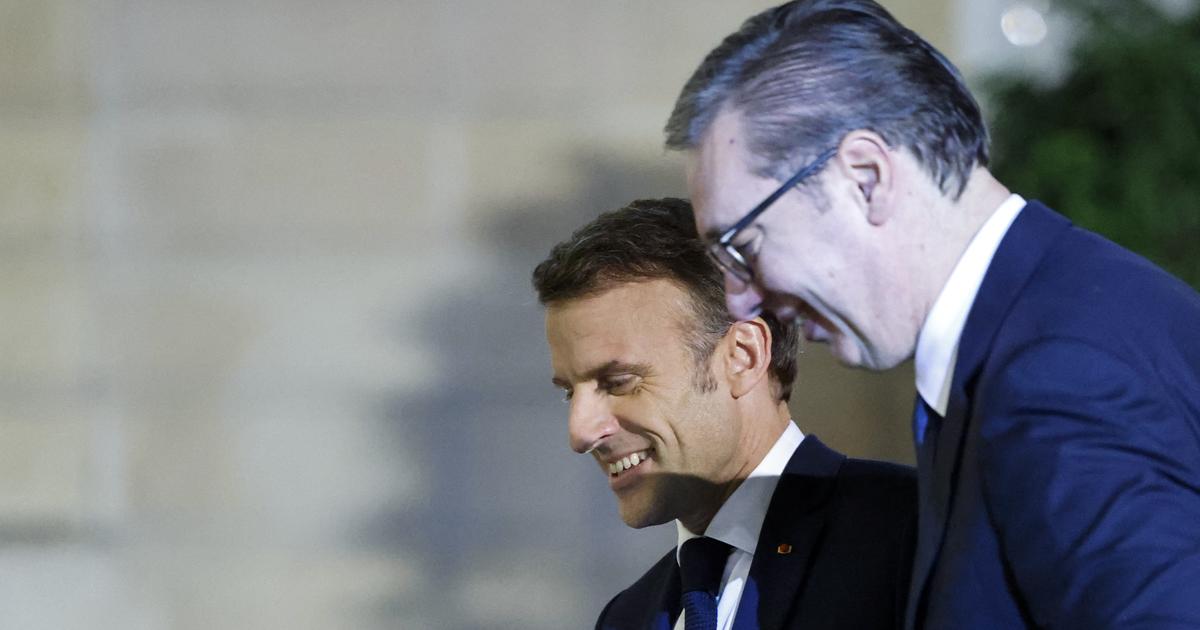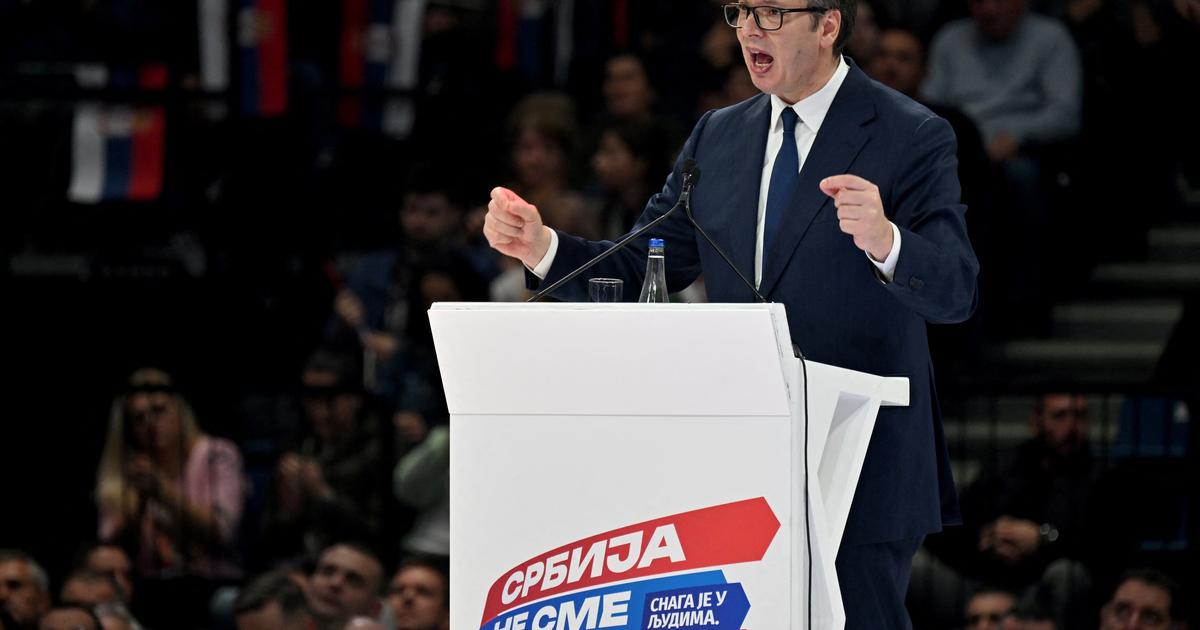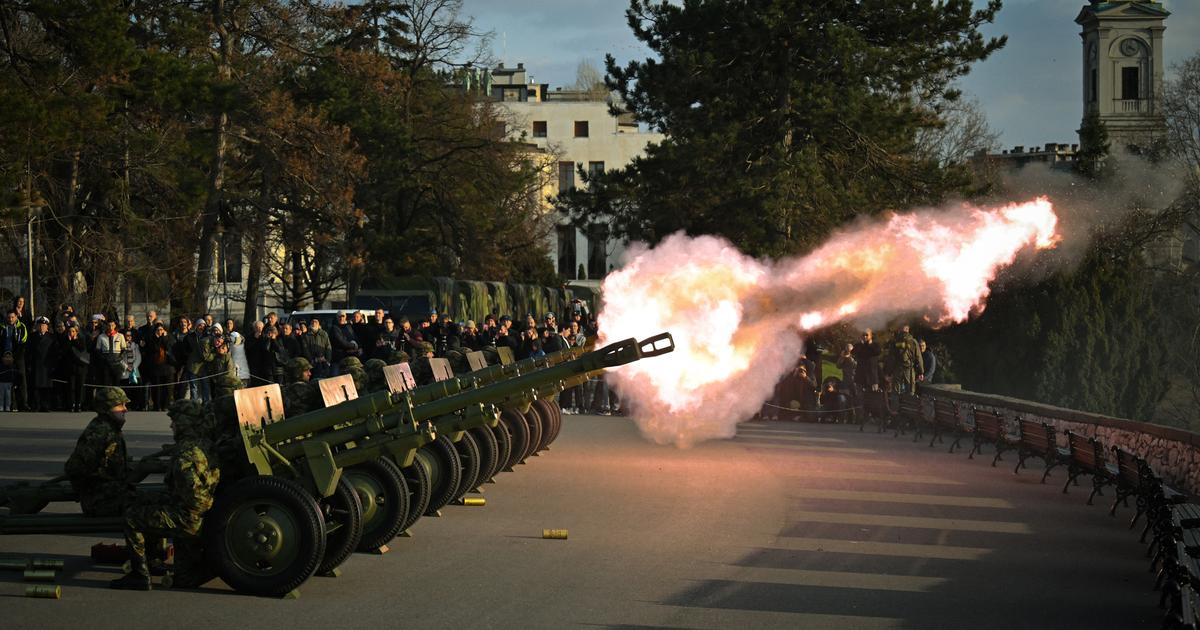Border to: Kosovo and Serbia before escalation?
The bloody history and the role of Russia
Created: 2022-12-28Updated: 2022-12-28, 4:51 p.m
By: Astrid Theil
NATO has been very active in Kosovo since the 1999 Kosovo war: Here, NATO soldiers inspect a street barricade erected by ethnic Serbs near the town of Zubin Potok December 11, 2022. © Armend Nimani/AFP
The reports from Kosovo roll over.
Tensions with Serbia threaten to escalate.
The reasons for this conflict are complex.
An overview.
Belgrade/Pristina – The conflict appears to be about to escalate: Serbia is increasing the number of its soldiers on the shared border.
Politicians are concerned - there are even fears of a war breaking out in some places.
Kosovo closed its main border crossing with the neighboring country on Wednesday (December 28) in response to the erection of more road barricades on the Serbian side.
The "illegal blockade" has "obstructed the free movement of people and goods, which is why we ask our citizens and compatriots to use other border crossings," said the Kosovo police.
Serbian Defense Minister Milos Vucevic said Belgrade was ready to settle the conflict but gave no details.
The reasons for the conflict between Serbia and Kosovo, which flares up again and again, lie deeper in the common history of the two countries.
The roots of the tensions reach back to the end of the Second World War.
After 1945 the Socialist Federal Republic of Yugoslavia was founded on the Balkan Peninsula.
Its components: the republics of Slovenia, Croatia, Bosnia-Herzegovina, Serbia, Montenegro and Macedonia as well as the two autonomous provinces of Kosovo and Vojvodina, which belong to Serbia.
The state construct finally disintegrated in a long, sometimes extremely violent process that began in the early 1990s.
Kosovo War 1998/99: bloody conflict in the Balkans
Kosovo declared its independence in 1991 after the collapse of Yugoslavia.
However, Serbia (then still in the form of Yugoslavia) refused to recognize this.
Finally, in 1998, the situation between Serbia and Kosovo escalated.
The Kosovo War broke out as part of the Yugoslav Wars.
Serbian units are said to have committed massive human rights violations in their offensives against the Kosovars and their attempts at autonomy.
NATO intervened – without an international mandate.
The Serbian units finally withdrew from Kosovo on June 10, 1999.
The Serb population in Kosovo shrank sharply.
Of the approximately two million inhabitants of Kosovo today, 92 percent are of Albanian descent.
A good 1.5 percent are Serbs, most of whom live in the north of the country.
Negotiations on the status of Kosovo initially remained fruitless.
Serbia maintained Kosovo's affiliation with Serbia with the support of Russia.
Kosovo continued to strive for independence.
The Serbs living in Kosovo, in turn, campaigned for Kosovo to belong to Serbia.
In 1999 and 2004 there were pogrom-like riots by Albanians against the Serb minority in Kosovo.
Kosovo's independence in 2008: not yet recognized by all states
On February 17, 2008, the Kosovo Parliament finally proclaimed its independence from Serbia.
To date, however, Kosovo has not been recognized as an independent state by some states - above all by Serbia.
Other states that do not recognize Kosovo include Russia and China, as well as the EU states of Spain, Greece, Slovakia and Romania.
also read
Putin cancels trip at short notice – the Kremlin's reasoning arouses suspicion
READ
Ukraine reports wave of Russian desertions in Luhansk – even local military leaders already retreating?
READ
Bachmut new epicenter of the war: Ukraine is apparently preparing for bloody urban warfare
READ
Benedict “very ill”: Pope Francis leaves experts guessing – biographer attests longing for “going home”
READ
Macabre "special offer" from Putin?
According to insiders, Russian recruits can go to the sperm bank for free
READ
Fancy a voyage of discovery?
My space
Despite many efforts by the EU to improve relations between Serbia and Kosovo (e.g. with a moderated Serbia-Kosovo dialogue in 2011), the conflict between the two countries could not be resolved.
Negotiations to improve the relationship were not very successful.
The most recent resumption of talks in the summer of 2021 also made no progress.
Neither Kosovo nor Serbia are retreating from their positions in the conflict and blaming each other for the stalled talks.
Kosovo-Serbia conflict: Dispute over car license plates and identity papers
In the past two years, there have been repeated escalations in Serbian-Kosovar relations.
The fundamental conflict about the independence of the state breaks out in various disputes.
In 2021, the countries were arguing about the recognition of license plates.
A military build-up in the border area followed.
In the summer of 2022 there was a dispute about the recognition or non-recognition of identity papers - the next flare-up of Zoff.
However, both the dispute over the license plates and the identity papers were settled over the course of the year with the mediation of the EU.
However, tensions between Serbia and Kosovo are currently escalating again.
Since the beginning of December there have been riots and exchanges of fire between the Kosovar police and the Serbian minority living in the north.
Militant Serbs are constantly erecting barricades in the predominantly Serb-inhabited north of Kosovo, which mainly block the roads to the border crossings to Serbia.
They are protesting against the arrest of a former Kosovo police officer of Serbian origin.
According to the Kosovan authorities, the man had led attacks on officials of the election commission.
Escalation threatened: Serbian troops in "highest combat readiness"
The militants are supported and sometimes even instructed by the government in Belgrade.
Serbian President Aleksandar Vucic keeps heating up tensions in Kosovo through these informal structures.
In the last five years he had put the Serbian armed forces on high alert six times.
So far always without consequences.
Now the transfer to increased alertness took place again.
Serbian Defense Minister Milos Vucevic said on Monday evening (December 26) that Vucic had ordered “the highest level of combat readiness”.
The German government has meanwhile expressed its "very concern" about the new tensions in northern Kosovo.
However, the Federal Foreign Office advises against trips to the four communities in northern Kosovo that are not absolutely necessary.
Russia's role in the Kosovo-Serbia conflict - Kremlin support
Russia is also involved in the current conflict.
The historical close connection between Serbia and Russia always played a role in the conflict with Kosovo.
The Kremlin said Wednesday it supports Serbia's attempts to protect ethnic Serbs in northern Kosovo.
Asked about Kosovar Interior Minister Xhelal Svecla's claim that Serbia under Russian influence aims to destabilize Kosovo by supporting the Serb minority, Kremlin spokesman Dmitry Peskov said it was "wrong" after a destructive Russian influence to search.
(at/dpa/AFP)













